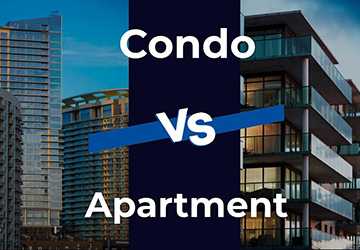Choosing between a condo and an apartment is a consequential decision that can profoundly affect your lifestyle, finances, and long-term contentment. This Condo vs apartment living guide endeavours to provide an exhaustive analysis to facilitate an erudite decision. We'll scrutinize the essential facets of both habitation options, contrasting their merits and demerits and proffering counsel on deciding between a condo and an apartment.

Before delving into the advantages and disadvantages, it's imperative to comprehend what differentiates condos from apartments.
A condo, an abbreviation for condominium, is a private abode within a larger building or complex. Each unit is individually owned, but communal areas and amenities are shared among all residents. Proprietors remit monthly fees to a homeowners association (HOA) to keep these shared spaces.
An apartment is a leased unit within a building or complex. Unlike condos, apartments are owned by a single entity, often a corporation, that rents individual units to tenants. Lessees typically have no ownership stake and do not pay HOA fees, but they must adhere to the mandates set by the property management.
To make an enlightened decision, it's essential to weigh the pros and cons of condos and apartments.
- Ownership: One of the primary merits of a condo is proprietorship. This means accruing equity over time and having the autonomy to refurbish and personalize your space.
Amenities: Condos frequently include amenities like gymnasiums, swimming pools, and security services, which augment the living experience.
- Community: Condos often engender a sense of community, with social events and common areas encouraging interaction.
- HOA Fees: While amenities are advantageous, the associated HOA fees can be a significant encumbrance. These fees are obligatory and can escalate over time.
- Rules and Regulations: Condos come with a codex of rules and regulations dictated by the HOA, which can circumscribe personal liberties.
- Maintenance Responsibility: As an owner, you're accountable for maintenance and repairs within your unit, which can be exorbitant.
- Flexibility: Apartments offer more excellent pliability, making them ideal for transient living or those needing to relocate frequently.
- Lower Upfront Costs: Leasing an apartment usually requires less initial investment than acquiring a condo.
- Maintenance-Free Living: Property management typically handles all maintenance and repairs, conserving renters' time and effort.
- No Equity Building: Renting does not build equity, meaning your monthly payments do not contribute to ownership.
- Limited Personalization: Renters cannot modify or personalize their living space.
- Potential for Rent Increases: Rent can escalate over time, often capriciously, making long-term budgeting arduous.
Deciding between a condo and an apartment involves considering several key factors. Here are some crucial points to ponder:
Condo vs Apartment Living Guide:
- Condos as Investments:
- Appreciation Potential: Condos generally experience accretion in value over time, offering substantial financial gains.
- Rental Income: Proprietors can lease their condos, generating lucrative rental revenue.
- Tax Benefits: Ownership frequently comes with fiscal deductions related to mortgage interest and property levies.
- Apartments as Investments:
- No Appreciation: Renting an apartment does not yield any accretion benefits.
- Flexible Financial Commitment: Short-term leases entail less pecuniary commitment than purchasing a condo.
- Lower Initial Costs: Apartments typically necessitate a smaller financial outlay than a condo.
How to Decide Between a Condo and an Apartment:
- Privacy in Condos:
- Ownership Rights: Condo owners possess complete dominion over their unit, ensuring greater privacy.
- Customization: Owners can refurbish and customize their condos to their preference.
- Limited Interference: HOA rules govern communal areas but rarely influence the personal use of individual units.
- Privacy in Apartments:
- Leasing Limitations: Renters have circumscribed ability to modify their space.
- Management Access: Property management may necessitate access to units for maintenance, impacting privacy.
- Community Living: Proximity to neighbours and shared facilities can diminish privacy.
Pros and Cons of Condos and Apartments:
- Community in Condos:
- HOA Meetings: Owners can engage in HOA meetings and influence community decisions.

- Social Activities: Condos often organize social events, fostering a robust sense of community.
- Shared Spaces: Common areas such as gardens, gyms, and lounges foster social interaction.
- Community in Apartments:
- Transient Population: Frequent tenant turnover can impede the development of a close-knit community.
- Limited Influence: Renters typically have less sway in property management.
- Social Opportunities: Some apartment complexes offer community events, albeit less frequently than condos.
How to Decide Between a Condo and an Apartment:
- Sustainability in Condos:
- Green Initiatives: Many contemporary condos incorporate green building practices and energy-efficient systems.
- Recycling Programs: HOAs often implement robust recycling and waste management initiatives.
- Community Gardens: Some condos feature community gardens, promoting sustainable living.
- Sustainability in Apartments:
- Energy Efficiency: Newer apartment buildings may also emphasize energy efficiency, but it varies widely.
- Recycling Facilities: Availability of recycling services hinges on property management.
- Urban Living: Apartments in urban locales diminish the necessity for car usage, contributing to lower carbon footprints.
How to Decide Between a Condo and an Apartment:
- Resale Value of Condos:
- Market Trends: The resale value of condos can be influenced by real estate market trends and location desirability.
- Upgrades: Owners can amplify marketability by upgrading their units.
- Lease Marketability of Apartments:
- Rental Market: The marketability of apartments is contingent on rental demand in the vicinity.
- Amenities: Attractive amenities and location can render apartments more desirable to prospective renters.
Pros and Cons of Condos and Apartments:
- Customization in Condos:
- Renovations: Owners can undertake significant renovations to suit their preferences.
- Interior Design: Full control over interior design, from paint colours to flooring and fixtures.
- Customization in Apartments:
- Restrictions: Renters are usually restricted in making significant modifications.
- Temporary Changes: Minor, non-permanent changes like painting (with approval) are sometimes allowed.
Choosing between a condo and an apartment is a multifaceted decision that requires meticulous consideration of financial, lifestyle, and personal factors. This Condo vs apartment living guide aims to equip you with the sagacity to make an informed choice. By weighing the pros and cons of condos and apartments and understanding how to decide between a condo and an apartment, you can confidently select the option that best aligns with your desiderata and objectives. Remember to balance your immediate requisites with your long-term aspirations to ensure a decision that yields satisfaction and tranquillity.